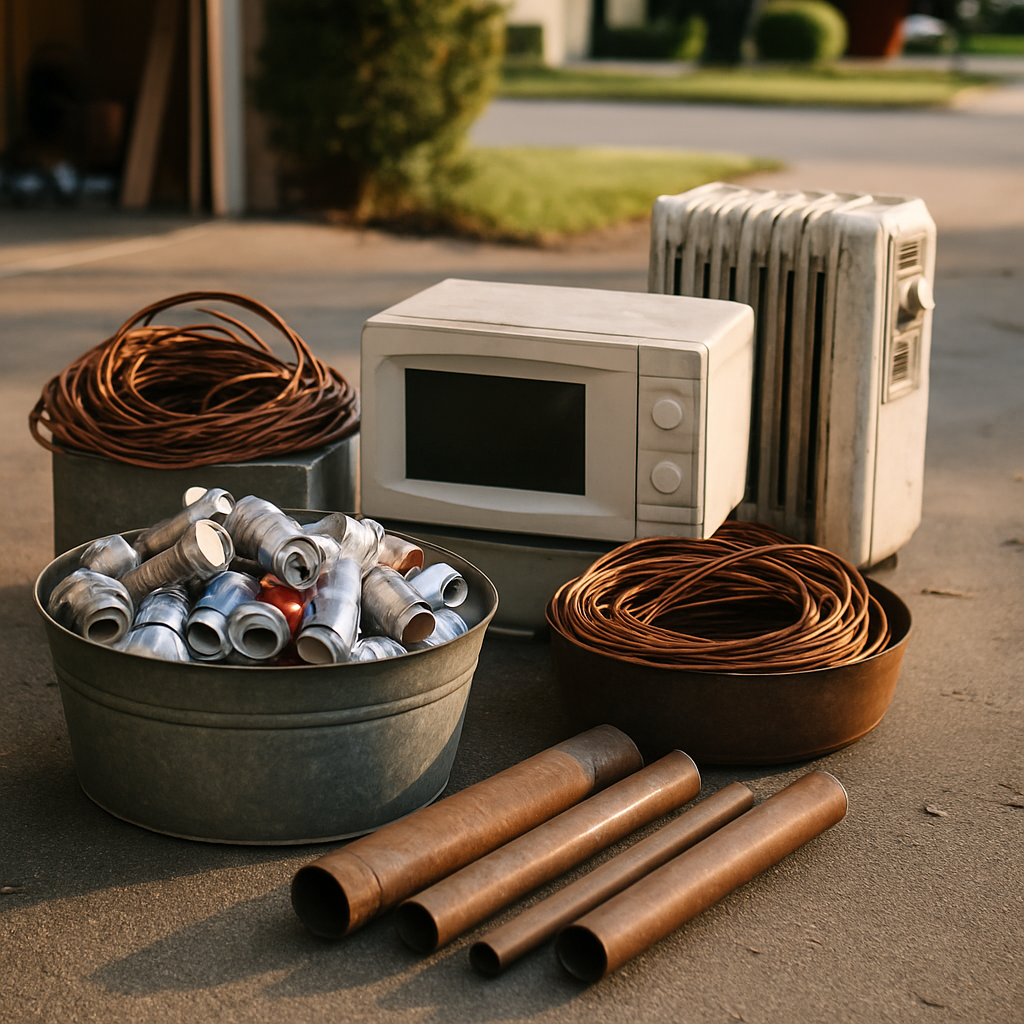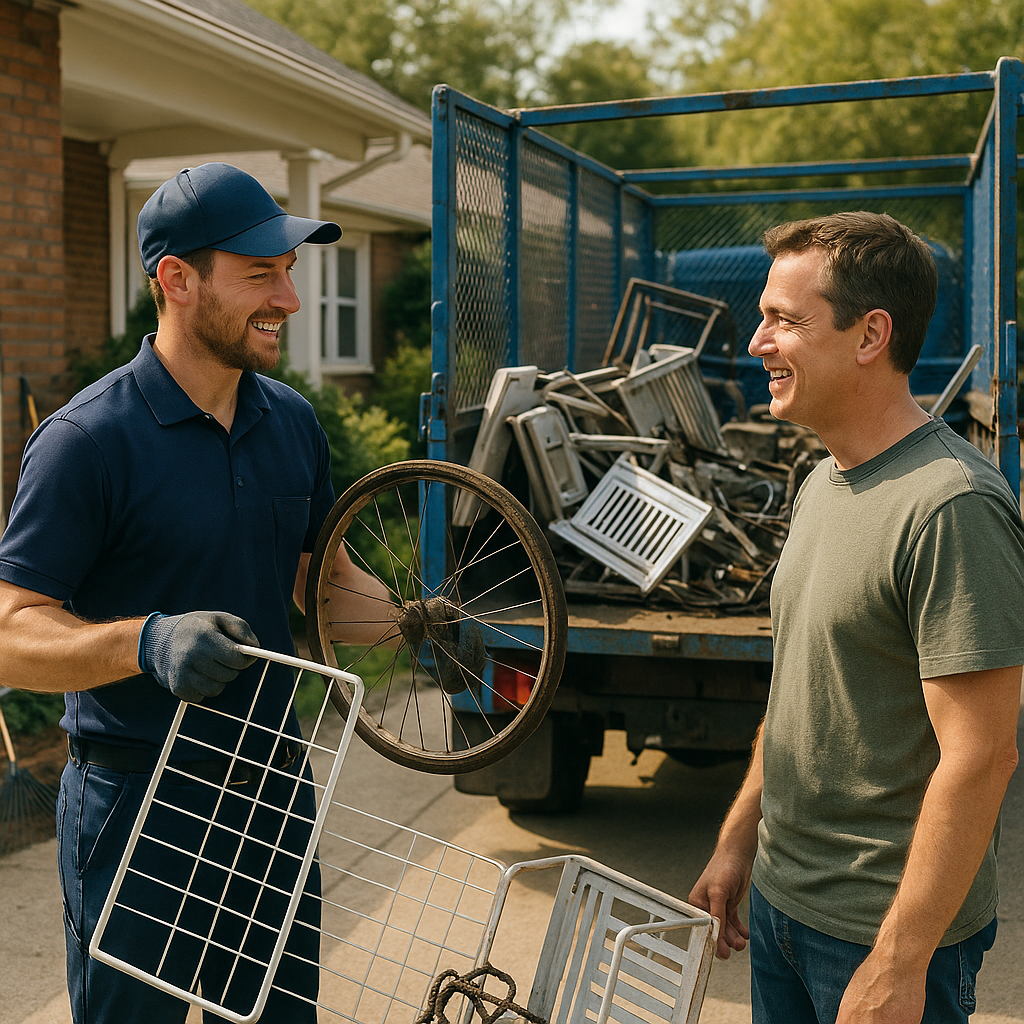5901 Botham Jean Blvd, Dallas, TX 75215
Scrap Metal Home Collection: Convenient Recycling, Benefits, and How It Works
September 25, 2025Do you have a pile of unwanted metal items cluttering your garage or basement? Scrap metal home collection offers a simple solution. This convenient service involves professional recycling companies coming directly to your residence to pick up and properly dispose of your metal waste.
These specialized collection services handle a wide variety of household metal items. Common examples include old appliances like refrigerators and washing machines, metal furniture frames, electronics with metal components, construction debris, and other metal waste that accumulates in homes over time.
The advantage of scrap metal home collection lies in its convenience. Instead of struggling to transport heavy or bulky metal items to a recycling facility yourself, professional junk removal companies do the heavy lifting.
What Types of Scrap Metal Can Be Collected?

Household scrap metal recycling offers more opportunities than many realize. Both ferrous (magnetic) and non-ferrous (non-magnetic) metals can be collected from homes, each with distinct recycling values and environmental benefits.
Ferrous Metals
Ferrous metals contain iron and are identifiable with a magnet. While they generally have a lower value per pound than non-ferrous metals, they constitute the bulk of household scrap by volume.
- Steel – Found in appliances, furniture frames, tools, and structural components
- Iron – Common in cast iron cookware, bathtubs, boilers, and outdoor furniture
- Stainless Steel – Present in kitchen sinks, appliances, and cookware
Non-Ferrous Metals
Non-ferrous metals don’t contain iron and won’t stick to a magnet. They typically command higher prices at recycling centers due to greater resistance to corrosion, higher conductivity, and lower weight.
- Aluminum – Beverage cans, food packaging, window frames, outdoor furniture, and siding
- Copper – Plumbing pipes, electrical wiring, air conditioning components, and cookware
- Brass – Doorknobs, keys, plumbing fixtures, and decorative items
- Bronze – Older plumbing components, decorative fixtures, and some tools
- Lead – Old pipes, wheel weights, and some older roofing materials
Common Household Items for Metal Recycling
Most homes contain numerous recyclable metal items that can be diverted from landfills. You can identify valuable scrap metal throughout your house, room by room.
- Kitchen – Appliances (refrigerators, ovens, dishwashers), pots and pans, silverware, aluminum foil, food cans
- Bathroom – Copper pipes, metal shelving, faucets, metal towel racks
- Living Areas – Lamp bases, picture frames, metal furniture components, doorknobs
- Garage/Garden – Tools, lawnmowers, metal fencing, patio furniture, bicycles, car parts
- Electronics – Computers, televisions, cables (contain valuable copper wiring)
- Construction Debris – Metal roofing, gutters, pipes, wiring, nails, screws
Preparing metals for recycling is straightforward but important. Items should be cleaned of food residue, paint, or other contaminants. For electronics and appliances, removing non-metal components can increase their recycling value.
Copper deserves special mention as one of the most valuable recyclable metals. It is commonly found in plumbing pipes, electrical wiring, air conditioning units, and small appliances. Its high conductivity makes it particularly valuable for recycling, as new copper requires significant energy to mine and refine.
Even small metal items like aluminum cans and food tins are worth recycling. The energy saved by recycling a single aluminum can is enough to power a television for three hours. Collectively, these small items can lead to significant environmental benefits.
| Metal Type | Household Sources | Recycling Value (per lb) |
|---|---|---|
| Copper | Plumbing pipes, electrical wiring, appliance motors | $3.55 – $3.70 |
| Aluminum | Beverage cans, window frames, old appliances | $0.70 – $1.00 |
| Brass | Doorknobs, plumbing fixtures, keys | $1.25 – $2.80 |
| Stainless Steel | Appliance exteriors, cookware, sinks | $0.30 – $0.40 |
| Cast Iron | Cookware, radiators, bathtubs | $0.07 |
Understanding which household items contain recyclable metals not only helps divert waste from landfills but can also provide economic benefits when materials are properly sorted and taken to recycling facilities.
How Does the Collection Process Work?

The scrap metal collection process is efficient and convenient. Recycling companies typically start by allowing customers to schedule a pickup online or by phone. During this contact, you often receive an upfront price estimate based on material type and quantity.
After scheduling, professional collection teams arrive at your location with the appropriate tools and vehicles for handling scrap metal. They assess your materials on-site, weighing and categorizing them according to metal type to ensure fair compensation based on current market rates.
The team manages the heavy lifting, using specialized equipment to remove items from your property while taking care to prevent damage. Many companies offer same-day or next-day service, depending on location and the volume of scrap collected.
Collected scrap metal is then transported to processing facilities for further sorting. The metals are separated into ferrous (iron-containing) and non-ferrous categories, using both manual techniques and advanced machinery like magnets and sensors. This sorting is crucial for maximizing recyclability and the value of materials.
Many recycling companies provide scheduled pickup services or designated collection containers for businesses with regular scrap metal output, ensuring clean workspaces and generating reliable revenue from materials otherwise discarded.
Recycling facilities may also offer roll-off containers for construction sites or large cleanups, simplifying the collection and transport of substantial scrap amounts. These containers are delivered to your location and picked up when full, streamlining the collection process.
Proper documentation is maintained throughout, important for businesses needing records of recycling activities for compliance or sustainability reporting purposes. This paperwork typically includes weight receipts, material types, and payment information.
| Step | Description |
| Collection Scheduling | Customers schedule a pickup through the company’s website or by phone. |
| Assessment | Teams assess materials on-site, weighing and categorizing by metal type. |
| Collection | Items are removed using specialized equipment and loaded onto trucks. |
| Transportation | Scrap metal is transported to processing facilities for sorting. |
| Sorting | Metals are separated by type using manual techniques and machinery. |
| Processing | Metals are sorted and prepared for recycling. |
| Payment | Customers receive payment based on market rates and material weight. |
The final step is payment, usually processed immediately upon receipt and weighing of materials. Companies may offer direct deposit, cash, or check payments, making the process environmentally responsible and financially rewarding.
What Are the Benefits of Home Scrap Metal Collection?

Home scrap metal collection transforms what might otherwise be considered junk into valuable resources while offering significant advantages for both homeowners and the environment. Instead of letting old appliances, metal furniture, or renovation scraps take up space or end up in landfills, professional collection services provide a convenient solution with far-reaching benefits.
Environmental Sustainability
The environmental impact of scrap metal collection is substantial. When metals end up in landfills, they can remain there for hundreds of years without biodegrading. Research shows that over 9 million tons of metal waste enter American landfills annually despite being recyclable.
Recycling just one ton of steel conserves 2,500 pounds of iron ore, 1,400 pounds of coal, and 120 pounds of limestone. This conservation extends to precious water resources, as metal recycling requires significantly less water than extraction processes.
The energy savings are equally impressive. Manufacturing products from recycled aluminum saves up to 95% of the energy required for production from raw materials. Steel recycling achieves around 60% energy reduction compared to using virgin materials. The Environmental Protection Agency reports that metal recycling keeps millions of tons of waste from entering landfills each year.
Convenience and Time Savings
One of the most immediate benefits of home scrap metal collection is the convenience it offers. Transporting heavy metal items to recycling centers can be challenging without proper vehicles or physical capability. Collection services eliminate this burden by coming directly to your location.
This convenience results in significant time savings. Rather than managing the loading, securing, and transporting metals yourself, professional collectors handle everything. Most services require minimal preparation – simply having items accessible for pickup is often sufficient.
Many collection programs also offer scheduling flexibility. You can arrange pickup times that fit your schedule, making responsible disposal easier than ever. This convenience helps ensure proper recycling.
Financial Returns
Surprisingly to many homeowners, scrap metal collection can provide direct financial benefits. Certain metals like copper, aluminum, and brass command significant value in recycling markets. Collection services often pay for these materials based on current market rates and weight.
Even for services that don’t offer direct payment, the free removal represents significant savings compared to disposal fees for large metal items. This financial aspect makes recycling not just environmentally responsible but economically sensible.
The value of different metals varies considerably. Copper typically fetches the highest prices, with aluminum, brass, and steel following. While prices fluctuate with market conditions, the opportunity to convert unwanted metal items into cash remains a compelling advantage.
Safety Benefits
Professional scrap metal collectors are trained to handle potentially hazardous materials safely. Some appliances contain harmful substances like refrigerants or mercury switches that require special handling. Collection services ensure these materials are managed properly, reducing risks for homeowners.
These professionals also have the proper equipment and expertise to move heavy or awkwardly shaped metal items safely. This reduces the risk of personal injury that might occur during the self-transport of large metal objects.
Support for the Circular Economy
Home scrap metal collection services play a crucial role in supporting the circular economy. Unlike many materials that degrade during recycling, metals can be recycled repeatedly without losing their essential properties.
This circular approach creates more resilient local economies less dependent on imported raw materials. The Institute of Scrap Recycling Industries notes that millions of metric tons of scrap materials are recycled across the United States each year, including 85 million tons of iron and steel alone.
By participating in home collection programs, you help transform the traditional take-make-dispose model into a sustainable cycle where materials maintain their value indefinitely. Your old appliances and metal items re-enter the production stream, reducing the need for resource-intensive mining operations.
| Metal | Energy Savings | Environmental Impact |
|---|---|---|
| Aluminum | Up to 95% | Reduces CO₂ emissions by over 12 tons per ton |
| Copper | Up to 85% | Reduces mining activities and energy consumption |
| Steel | 60-75% | Conserves 2,800 lbs of iron ore, 1,600 lbs of coal, and 600 lbs of limestone per ton |
| Brass | N/A | Reduces mining energy consumption, preserving resources |
| Lead | N/A | Prevents accumulation of toxic lead in landfills |
When considering how much scrap metal might be accumulating in your home, garage, or yard, the benefits of professional collection become clear. From environmental protection to convenience and potential financial returns, these services offer a simple yet impactful way to dispose of unwanted metal items responsibly while contributing to a more sustainable future.
How to Choose a Scrap Metal Collection Service

Choosing the right scrap metal collection service can greatly impact both your financial returns and your contribution to sustainability. When evaluating potential service providers, consider several key factors to guide your decision-making process.
Pricing Transparency
Select services with clear, straightforward pricing structures. Reputable companies will explain how they determine rates based on current market values and will provide detailed estimates without hidden fees.
Scrap metal prices fluctuate due to global supply and demand, commodity markets, and energy costs. A trustworthy service will be upfront about these factors and their impact on your payment.
Inquire about potential service providers’ weighing systems and payment methods. Accurate scales and flexible payment options indicate a commitment to fair business practices.
Recycling Practices
Assess the thoroughness of a collection service’s recycling processes. Companies with advanced sorting technologies can often recover more material, reducing landfill waste and enhancing environmental benefits.
Top scrap metal collectors prioritize sustainable processing methods that minimize energy use and pollution. Some even provide documentation of their environmental compliance and recycling rates.
Check if the service has the proper licensing and certifications from relevant environmental authorities. These credentials verify their commitment to responsible waste management.
Customer Reviews and Reputation
A company’s track record reveals much about its reliability and service quality. Check online reviews, ask for references, or get recommendations from others in your industry who regularly use scrap metal collection services.
Look for patterns in feedback regarding punctuality, professionalism, and payment reliability. While a few negative reviews are normal, consistent complaints about the same issues should be concerning.
Membership in industry associations like recycling organizations or business bureaus can also indicate a commitment to professional standards.
Service Offerings
Consider additional services that might benefit your situation. Some companies offer container rentals for ongoing scrap accumulation, while others provide on-site pickup to save transportation costs.
For businesses generating large volumes of scrap, look for services offering regular scheduled pickups or customized collection solutions. Some providers even supply detailed reports to assist with sustainability tracking.
Ensure the service has the proper equipment for your specific type and volume of scrap metal. Different materials require different handling methods, and the right provider will have specialized tools for efficient collection.
Location and Accessibility
The proximity of a collection service affects convenience and potential transportation costs. Services operating in your area usually offer more responsive pickup times and better overall service.
Some companies cover wider areas but may have minimum volume requirements for distant locations. Clarify these details before committing to ensure they can meet your needs.
Ask about their scheduling flexibility and typical response times for pickup requests. A service that can fit your timeline will smooth the recycling process.
Conclusion: Simplifying Scrap Metal Recycling at Home
Scrap metal home collection services simplify the recycling process, making it both easy and rewarding. These services eliminate the need for homeowners to transport heavy metals to recycling facilities. With a single phone call or online form submission, unwanted metal items can be picked up directly from your property.
The benefits go beyond convenience. By recycling scrap metal properly, you actively contribute to conserving resources, saving energy, and reducing waste. Metal recycling requires significantly less energy than producing new materials from raw resources. Moreover, many collection services offer payment for valuable metals like copper, aluminum, and brass, potentially turning your cleanup project into a profitable endeavor.
Interested in simplifying your recycling efforts while positively impacting the environment? Contact Okon Recycling at 214-717-4083 for professional scrap metal recycling that make responsible disposal effortless and rewarding.
